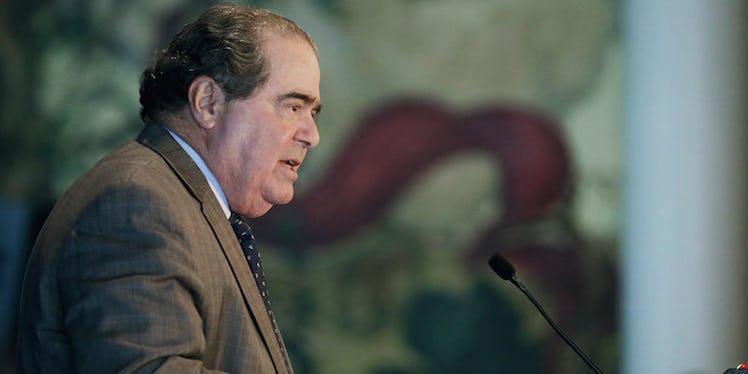
This Is What Will Happen To The Supreme Court Without Justice Scalia
Supreme Court Associate Justice Antonin Scalia died on Saturday morning in Texas. He was 79 and served on the Supreme Court since Ronald Reagan nominated him in 1986.
In his time on the court, Scalia left a legacy of conservatism and a strict adherence to the Constitution. He was against same-sex marriage, affirmative action and abortion, and supported the death penalty and the right to bear arms.
These stances make Scalia's passing a conflicting moment. Of course the loss of a life is tragic, especially for Scalia's family and loved ones. But on a political level, a space is open in the Supreme Court that has the potential to protect or challenge rights and privileges.
The Supreme Court is in the middle of their hearing sessions for cases and will announce their decision in June. But now they have just eight justices.
So, what exactly happens?
How does the next Supreme Court justice get picked?
A Supreme Court justice is nominated by the president and has to be approved by a Senate vote. This is where things are already getting feisty.
In a speech on Saturday evening, President Barack Obama said that he fully intends on making a nomination.
However, Senate Majority Leader Mitch McConnell, a Republican, said that the space should not be filled until the next president is in office next January. The GOP has made it pretty clear already that they will put up a fight on Obama's nomination. Obama seemed to call out that standpoint in his speech.
Republican presidential candidates Ted Cruz and Marco Rubio made it clear that they expect the next president to make the nomination, not Obama.
At the Republican debate on Saturday night, candidate John Kasich said Obama should not make a nomination. Donald Trump and Jeb Bush said Obama can make a nomination -- because the GOP Senate will block that nomination.
The Republicans in Congress have already proven that they are more than happy to block Obama's attempts to make moves for this country. Their calls to block a nomination indicate a long fight to come.
Democratic presidential candidate Hillary Clinton said in a statement that the calls to block Obama's nomination "dishonor our Constitution."
The longest Supreme Court justice appointment process was the nomination of Clarence Thomas in 1991, which took 107 days.
We'll have to wait to see how long the Senate keeps us from getting a new justice. This is a good reminder that the presidential election has a lot of effects, including who gets nominated to the Supreme Court and thus how legal decisions are made in our country. Go vote!
But how does the Supreme Court work with eight justices?
Without Scalia, the Supreme Court is down to eight justices. They will continue functioning on schedule with the remaining eight.
But you might have noticed that eight is an even number, which can complicate decisions. It's entirely possible that some cases end in a tie, with four justices on either side.
In the case of a tie, the Supreme Court lets the lower court decision stand, according to the National Review.
But, that decision does not set a national precedent -- so all future courts do not have to follow that decision, which they would have had it been a set decision in the Supreme Court.
So what does this mean for this year's Supreme Court cases?
There are a handful of major cases being heard in the Supreme Court this year. Scalia's cast votes that were not made publicly do not count in the decisions, according to SCOTUSblog.
A big case this year is Fisher v. University of Texas, which questions the use of affirmative action. Scalia was not a fan of affirmative action and likely would have voted to lessen its use. Without him, the decision is a little more up in the air.
The Supreme Court is also hearing Whole Woman's Health v. Hellerstedt (formerly Whole Woman's Health v. Cole) a landmark case on abortion access. This challenges a Texas law requiring abortion clinics to meet the requirements of ambulatory surgical centers and have hospital admitting privileges. Both of those requirements are unnecessary for the generally safe abortion procedure and essentially only serve to shut down clinics. Should this law stand by the Supreme Court, only 10 clinics will be left in Texas.
Scalia was against having abortion be Constitutionally protected and said that he wanted to repeal Roe v. Wade, which made abortion legal. It's fairly clear that he would have voted to hold up the Texas law.
The Texas law likely has four justices against it, according to Vox. Justice Anthony Kennedy could come through with the fifth vote to get a majority decision to strike down the law, 5-3.
If Kennedy doesn't come through, however, the case would end in a 4-4 tie. With a tie, it would go to the lower court decision, which held up the law, restricting abortion access in Texas.
But, that decision would not set a national precedent. In other words, other states would not be in the clear to pass similar laws restricting access without facing legal challenges. Whereas, if Scalia were there to make a 5-4 vote in favor of the law, other states could pass similar restrictive laws with no big problems.
The Supreme Court decisions will be announced in June. We will be standing by to see how these decisions go, as well as to see who Obama nominates and how the Senate reacts.